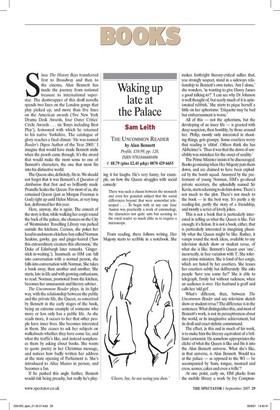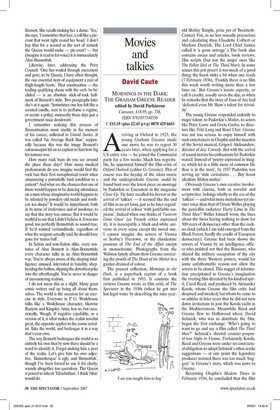Waking up late at the Palace
Sam Leith THE UNCOMMON READER by Alan Bennett Profile, £10.99, pp. 128, ISBN 9781846680496 © 0.79 (plus £2.45 p&p) 0870 429 6655 Since The History Boys transferred first to Broadway and then to the cinema, Alan Bennett has made the journey from national treasure to international superstar. The dustwrapper of this droll novella spends two lines on the London gongs that play picked up, and more than five lines on the American awards (five New York Drama Desk Awards, four Outer Critics' Circle Awards . . . six Tonys including Best Play'), festooned with which he returned to his native Yorkshire. The catalogue of glory reaches a final climax: 'He was named Reader's Digest Author of the Year 2005.' I imagine that would have made Bennett smile when the proofs came through. It's the award that would make the most sense to one of Bennett's characters, the one that most fits into his distinctive world.
The Queen also, definitely, fits in. We should not forget that it was Bennett's A Question of Attribution that first and so brilliantly made Prunella Scales the Queen. For most of us, she remained Queen (just as Morgan Freeman is God) right up until Helen Min-en, at very long last, dethroned her this year.
Here, anyway, she is again. The conceit of the story is that, while walking her corgis round the back of the palace, she chances on the City of Westminster Travelling Library van parked outside the kitchens. Curious, she pokes her head in and meets a kitchen-boy called Norman Seakins, gawky, gay and ginger-haired (Saw this extraordinary creature this afternoon,' the Duke of Edinburgh later remarks. 'Gingerstick-in-waiting.'). Inasmuch as HM can fall into conversation with a normal person, she falls into conversation with Norman. She takes a book away, then another and another. She starts, late in life and with growing enthusiasm, to read. Norman, promoted from the kitchen, becomes her amanuensis and literary adviser.
The Uncommon Reader plays, in its light way, with the relationship between the public and the private life, the Queen, as conceived by Bennett in the early stages of the book, being an extreme example of someone who more or less only has a public life. As she reads more, it occurs to her that other people have inner lives. She becomes interested in them. She ceases to ask her subjects on walkabouts whether they have come far, and what the traffic's like, and instead nonplusses them by asking about books. She wants to quote poetry in her Christmas message, and notices how badly written her address at the state opening of Parliament is. She's introduced to Alice Munro in person, and becomes a fan.
If he pushed this angle further, Bennett would risk being preachy, but really he's playing it for laughs. He's very funny, for example, on how the Queen struggles with social comedy: There was such a chasm between the monarch and even her grandest subject that the social differences beyond that were somewhat telescoped . . . To begin with at any rate Jane Austen was practically a work of entomology, the characters not quite ants but seeming to the royal reader so much alike as to require a microscope.
makes forthright literary-critical sallies that, you strongly suspect, stand in a sideways relationship to Bennett's own tastes. 'Am I alone,' she wonders, 'in wanting to give Henry James a good talking-to9"I can see why Dr Johnson is well thought of, but surely much of it is opinionated rubbish.' She starts to pique herself a little on her aphorisms: 'Etiquette may be bad but embarrassment is worse.'
All of this — not the aphorisms, but the developing of an inner life — is greeted with deep suspicion, then hostility, by those around her. Philip, mostly only interested in shooting things, gets grumpy. Some courtiers worry that reading is 'elitist'. Others think she has Alzheimer's: 'Thus it was that the dawn of sensibility was mistaken for the onset of senility.'
The Prime Minister insists it be discouraged. Books go missing when Her Majesty puts them down, and are claimed to have been exploded by the bomb squad. Annoyed by the preferment of young Norman, HM's go-ahead private secretary, the splendidly named Sir Kevin, starts scheming to do him down. There's not much to the plot. There's not much to the book — in the best way. It's partly a sly reading-list, partly the story of a friendship, and mostly a series of lovely jokes.
This is not a book that is particularly interested in telling us what the Queen is like. Fair enough; it's fiction. It is not a book, either, that is particularly interested in imagining plausibly what the Queen might be like. Rather, it vamps round the stock ideas, available to any television sketch show or student revue, of what she is like. Bennett's Queen uses 'one', incorrectly, in free variation with 'I'. She tolerates prime ministers. She is fond of her corgis, which are hated by her courtiers. She teases her courtiers subtly but deliberately. She asks people 'have you come far?' She is able to telegraph, firmly but without rudeness, when an audience is over. Her husband is gruff and calls her 'old girl'.
What's different, then, between The Uncommon Reader and any television sketch show or student revue? The difference is in the sentences. What distinguishes this, and most of Bennett's work, is not its perceptiveness about the world, or its imaginative achievement, but its droll and exact stylistic commmand.
The effect, in this and in much of his work, is to make him the literary equivalent of a brilliant cartoonist. He somehow appropriates the cliché of what the Queen is like and fits it into the Alan Bennett universe. What she's like, in that universe, is Alan Bennett. Would tea at the palace — as opposed to the WI — be accompanied by 'ham, tongue, mustard and cress, scones, cakes and even a trifle'?
At one point, early on, HM plucks from the mobile library a work by Ivy ComptonBurnett. She recalls making her a dame. 'Yes,' she says, 'I remember that hair, a roll like a piecrust that went right round her head.' I don't buy that for a second as the sort of remark the Queen would make — pie-crust? — but (imagine it read in his voice) it is immaculately Alan-Bennettish.
Likewise, later, addressing the Privy Council: 'One has waded through excrement and gore; to be Queen, I have often thought, the one essential item of equipment a pair of thigh-length boots.' That construction — the trailing qualifying clause with the verb `to be' elided — is an absolute stick-of-rock hallmark of Bennett's style. Two paragraphs later she's at it again: 'Sometimes one has felt like a scented candle, sent in to perfume a regime, or aerate a policy, monarchy these days just a government-issue deodorant.'
I remember noticing this process of Bennettisation most starkly in his memoir of his cancer, collected in Untold Stories. It was called 'An Average Rock Bun', supposedly because this was the image Bennett's colonoscopist hit on to explain to him how big his tumour was.
How many rock buns do you see around the place these days? How many medical professionals do you imagine would find the rock bun their first metaphorical resort when announcing a potentially fatal condition to a patient? And what are the chances that one of those would happen to be dancing attendance on a man whose imaginative world happens to be infested by powdery old maids and northern tea-shops? It would be impertinent, both in its sense of irrelevance and of insolence, to say that this story was untrue. But it would be truthful to say that I didn't believe it. It was too good, too perfectly Bennettish, to sound true. If he'd wanted verisimilitude, regardless of what the surgeon actually said, he should have gone for `tennis ball'.
In fiction and non-fiction alike, every sentence of Alan Bennett is Alan-Bennettish; every character talks in an Alan-Bennettish way. You're always aware of the shaping intelligence: amused, interested in banality, shepherding the bathos, slipping the downbeat joke into the afterthought. You're never in danger of encountering realism.
I do not mean this as a slight. Many great comic writers end up being all about themselves. The world is the occasion for an exercise in style. Everyone in P. G. Wodehouse talks like a Wodehouse character, likewise Runyon and Kingsley Amis, less so, but occasionally, Waugh. If negative capability, or a version of it, is what makes the realist novelist great, the opposite applies to the comic novelist. Take the world, and burlesque it in a way that's your own.
The way Bennett burlesques the world is so entirely his own that by now there should be a word to identify it. Forget making him a peer of the realm. Let's give him his own adjective. `Bennettesque' is ugly, and `Bennettish', though I've been forced to use it for clarity, sounds altogether too querulous. The Queen is poised to inherit 'Elizabethan' I think 'Alan' would do.








































 Previous page
Previous page